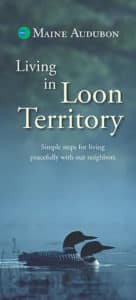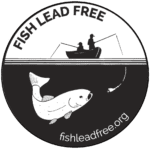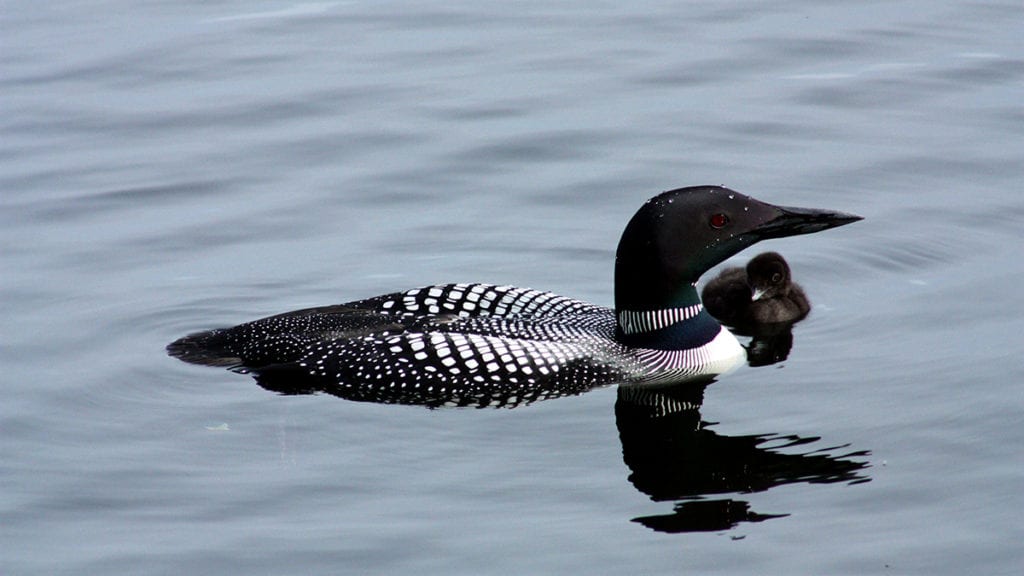The Maine Loon Project has worked for more than three decades to assess the status and safeguard the future of Maine’s loon population.
 Through this project, Maine Audubon works with residents and partners statewide to promote healthy lakes, clean water, and quality habitat for loons and to understand trends in their population over time. The project includes loon monitoring programs including the Annual Loon Count and the Maine Loon Restoration Project as well as loon outreach and education programs.
Through this project, Maine Audubon works with residents and partners statewide to promote healthy lakes, clean water, and quality habitat for loons and to understand trends in their population over time. The project includes loon monitoring programs including the Annual Loon Count and the Maine Loon Restoration Project as well as loon outreach and education programs.
We collaborate with many projects and partners including Loon Smart with Maine Lakes Society, Signs of the Seasons with Maine Sea Grant, and over one thousand community scientists like you who participate in the annual Loon Count Learn more about Maine’s Common Loon (PDF) in this short guide or download the Living in Loon Territory brochure, with an overview of what loons are up to throughout the seasons.
Unfortunately, Maine Audubon is not equipped to assist with loon “rescues.” Here’s what to do if you have found a dead or injured loon or a loon egg you believe was abandoned.
Loon monitoring programs
The Loon Restoration Project
The Loon Restoration Project is a five- year project, funded from the result of an oil spill, that aims to increase loon nesting success and decrease loon mortality by engaging volunteers in four efforts:
• Placing artificial nests (rafts);
• Monitoring productivity of loon rafts;
• Expanding Fish Lead Free programs to reduce lead tackle use and related loon mortality;
• Launching a Look Out for Loons program to reduce disturbance to loons and increase nesting success through education and outreach.
More about the Loon Restoration Project >
The Annual Loon Count
Since 1983, from 7 to 7:30 am of the third Saturday of July each year, hundreds of volunteers venture onto lakes and ponds across the state to count loons as part of our Annual Loon Count. The observations recorded by our community scientist volunteers provide a “snapshot” of Maine’s loon population on lakes throughout the state at the same time each year. From these data, we are able to estimate the population and assess trends over time. Find out more and join the count >
Over the course of any given year, our loon biologists field a lot of questions about loon biology, behavior, and migration patterns. Here are answers to some of the most Frequently Asked Questions!
More about the Annual Loon Count >
Signs of the Seasons
Maine Audubon is partnering with the University of Maine on the Signs of the Seasons Phenology Program to increase the number of observations of loons and their chicks throughout the summer. Volunteers are observing the changes they see in loon families (when eggs are laid, when chicks hatch and stages of growth through the summer) using the online tool Nature’s Notebook. If you are interested in volunteering with Signs of the Seasons, please visit the website to register for a training, or contact Beth Bisson at beth.bisson@maine.edu.
Loon outreach and education programs
Fish Lead Free
 The Fish Lead Free initiative coordinates lead-free outreach across the northern tier of the United States. Maine’s efforts include:
The Fish Lead Free initiative coordinates lead-free outreach across the northern tier of the United States. Maine’s efforts include:
• Managing a cooperative website
(www.fishleadfree.org)
• Making lead-free tackle exchange kits available to any individual or group that wants to host an exchange or collection event
• Providing tackle boxes for kids stocked with lead-free tackle
• Offering presentations to groups interested in learning more about loons and the impacts of lead
Learn more about the Fish Lead Free program >
Bring in a guest speaker
A great way to spread the word about loons is to schedule a 45-minute multimedia presentation on “The State of Maine’s Loons” for your local garden club, lake association, or civic group. Email conserve@maineaudubon.org or call 207.781.2330 ext 219 to book a talk or to request brochures for distribution.
Loon Smart
Loon Smart is a partnership with the Maine Lakes that offers Lake Smart homeowners the opportunity to meet additional standards for their property that will help conserve loons and their habitat. To learn more about Loon Smart and how to bring Lake Smart to your community, contact Maine Lakes 207.495.2301 or via email.
Common Loons in the Classroom
Maine Audubon has developed a classroom curriculum for grades 3 through 6 centered around the loon and its lake habitat. To learn more, email conserve@maineaudubon.org.
Things you can do to be loon-friendly
• Obey the no-wake law within 200 feet of shore
• Use lead-free tackle (good alternatives are made of steel, tin, and bismuth).
• Dispose of fishing line so it does not get tangled up in a loon’s feet or bill.
• If you live on a lake, use phosphorus-free fertilizer and plant shrubs as a buffer along the shoreline to reduce run-off.
• If you see a loon on a nest, keep your distance and watch with binoculars.
• Keep garbage out of reach of loon egg predators, like skunks and raccoons.



